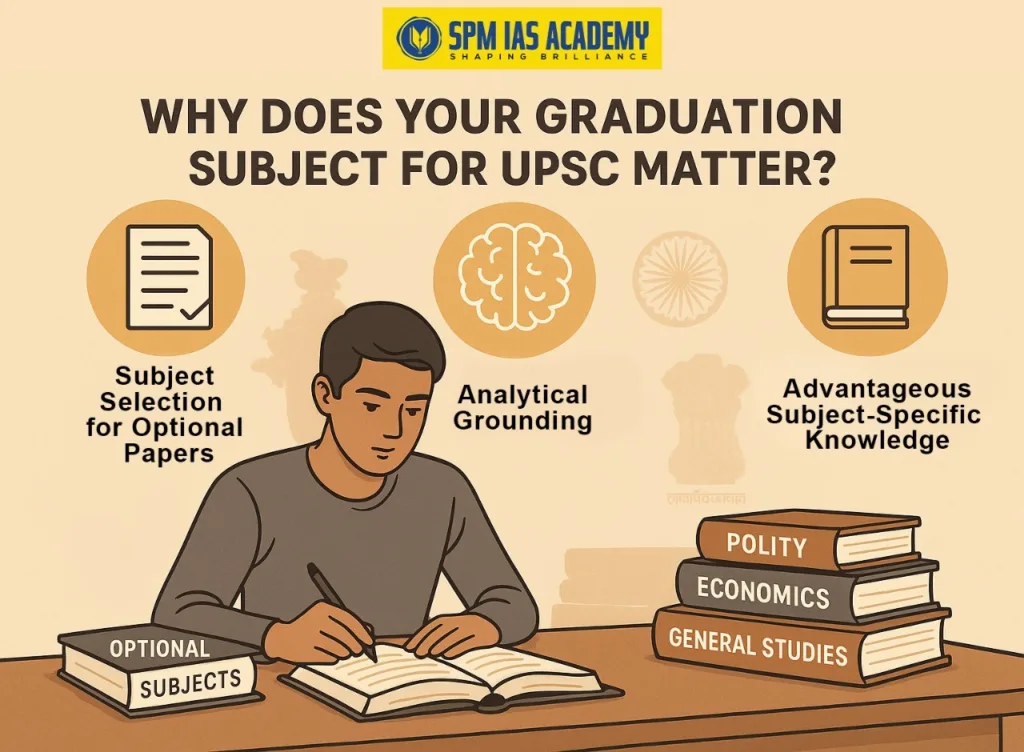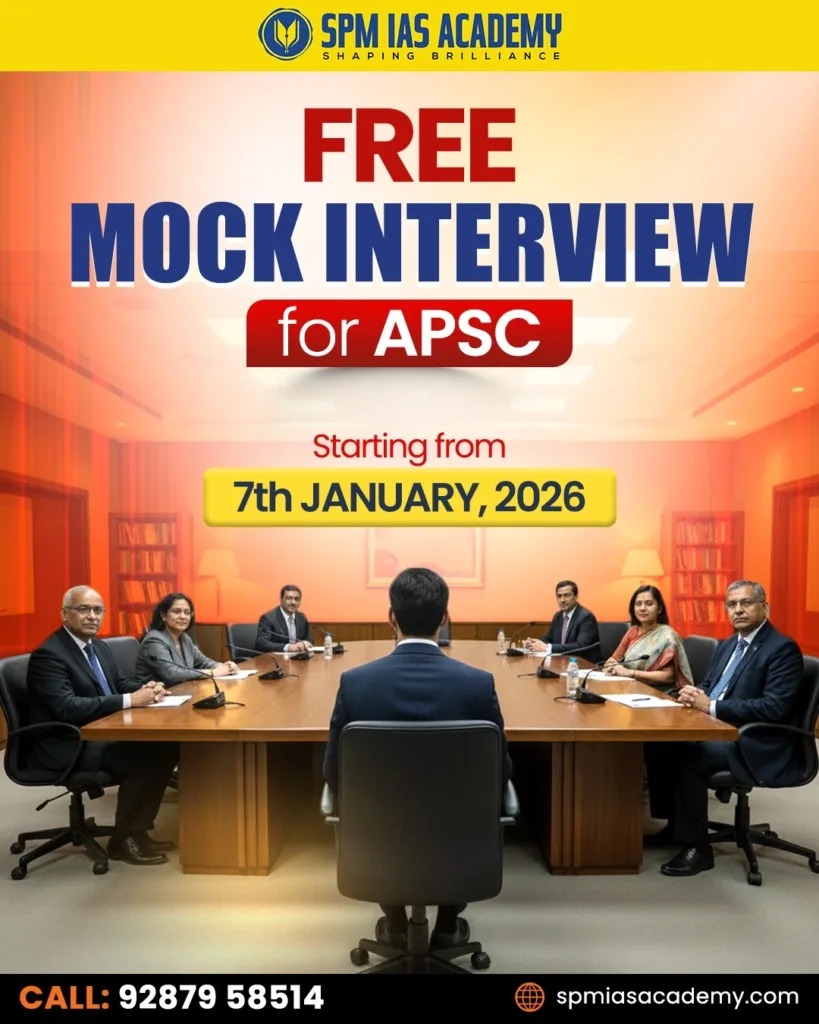The civil services are considered one of the most honourable and demanding careers for India’s youth. Clearing UPSC opens a direct route for serving your country. However, many future bureaucrats question whether their undergraduate degree directly affects their performance on civil service tests. Moreover, one of the recurring questions in many aspirants’ minds is what to choose as their graduation subject for UPSC.
In this article, we will explore the different graduation subject for UPSC and how they are interlinked with your UPSC exam preparation.
Understanding the UPSC Examination
The Civil Services Examination, conducted by the Union Public Service Commission (UPSC), consists of three phases:
- Preliminary Examination
- Mains Examination
- Interview
Rather than specific subject knowledge, the exam structure is designed to assess analytical ability, critical thinking, and administrative aptitude. However, the Mains include optional subjects alongside general studies papers. Additionally, in the interview, the panel will also assess your knowledge of the specific subjects you chose for your optional papers.
The UPSC minimum eligibility criterion is simply holding an undergraduate degree from a recognised university; there is absolutely no restriction on your graduation subject. However, the importance of your degree subject lies in the General Studies papers of the UPSC exam, specifically in the General Studies (GS) papers and, most crucially, your Optional Subject. Thus, selecting a proper graduation subject for UPSC can aid you in your civil services exam strategy.
Starting your UPSC exam preparation requires a strategic approach. Setting a proper study plan, understanding the syllabus, and focusing on regular revisions can make a significant difference in your preparation. For a structured approach, check out how to start your UPSC exam preparation.
Graduation Subject for UPSC
Even though your graduation subject does not determine eligibility for the UPSC Civil Services Examination (CSE), it can be an important strategic advantage in two critical areas:
- Optional Paper
- General Studies (GS) Papers.

1. Overlap with GS Papers
Your graduation subject can be a time-saver. It provides a strong foundation for the General Studies papers. This is true for both the Prelims and Mains. A smart graduation choice can directly build a strong foundation for the compulsory General Studies papers (GS I, II, and III). Below are a few examples to help you understand how graduation subjects for UPSC can be helpful.
a. Political Science & Public Administration (Pol. Sci. & Pub. Ad.): These subjects offer a direct overlap with GS Paper II. This includes Governance, Constitution, Polity, Social Justice, and International Relations. Thus, having a background in these areas provides deep conceptual clarity for half of the GS syllabus.
b. History & Sociology: A degree in these subjects is invaluable for GS Paper I. This paper covers Indian Heritage, Culture, History, and Society. Sociology, in particular, enhances your understanding of social issues. This understanding is helpful in essay writing. Additionally, it can also aid in GS Paper IV, which deals with Ethics and case studies.
c. Geography: This covers a large portion of GS Paper I. It focuses on Indian and World Geography. Additionally, it touches upon environment and disaster management. This is relevant for GS Paper III.
Choosing a subject with high overlap means you’re effectively preparing for two crucial components of the exam simultaneously, reducing your overall study time.
2. Optional Subject (500 Marks)
Your UPSC Optional Subject selection is where your graduation choice can have the biggest impact. The optional consists of two papers carrying a total of 500 marks, making it a key determinant of your final rank.
a. Leveraging Existing Knowledge: If you choose your graduation subject as your optional, such as a B.A. in History selecting History as an optional subject, you already have conceptual clarity. You are also familiar with the syllabus. This can save you months of dedicated study time. A non-major aspirant would need to invest that time to gain a similar understanding.
b. Choosing Based on Aptitude: Many aspirants from Science, Engineering, and Medical backgrounds choose to switch to popular humanities optionals. Some of these optionals include Sociology, Anthropology, and Political Science. They often find the content more manageable or scoring compared to their original fields. Additionally, their analytical skills, developed during technical graduation, can be effectively applied to the structured and analytical writing required in humanities optionals.
c. Interest Over Everything: Ultimately, the best optional subject is the one you are genuinely interested in. You will be studying this subject in depth, almost to the post-graduate level. If you don’t enjoy it, the preparation will become a tedious chore. This holds true regardless of how much overlap it has with General Studies. A high level of interest ensures consistency. It also allows you to write high-quality, analytical answers. This is the real key to scoring high.
d. Importance of English Literature: English Literature is a great option for UPSC. It significantly enhances critical thinking, analytical depth, and writing skills. These skills are important for the Mains General Studies and Essay papers.
NOTE: If your graduation subject for UPSC is humanities, it can be helpful for both GS 1 (in Prelims) and GS I, II, and III (in Mains). Moreover, if you are from a Medical or Engineering background, you also have the option to choose Optional Subjects from these. The difference lies in the fact that when choosing Optional Subjects from a Medical or Engineering background, you have less competition for these papers.
Selecting the right coaching institute is a pivotal part of your UPSC journey. In cities like Guwahati, many students find that the right APSC coaching helps sharpen their focus and provides guidance. Learn how to choose the right coaching institute for UPSC preparation.
Why does Your Graduation Subject for UPSC Matter? Key Points
Any degree makes you eligible for the UPSC examination. However, a strategically chosen graduation subject can provide an existing knowledge advantage. Furthermore, it offers a head start in the most score-determining parts of the exam.

1. Subject Selection for Optional Papers
Your graduation subject for UPSC will be most helpful during your optional papers during UPSC exam preparation. Since students possess a fundamental understanding of their major fields, they typically excel in courses related to their degree. For instance, engineering graduates commonly excel in Mathematics, Physics, or other technical disciplines. Likewise, many history graduates choose to study history as an optional course. Graduates in economics often find that this subject comes naturally to them. Although this relationship is not always perfect, many qualified applicants still opt for courses that are unrelated to their majors.
2. Analytical Grounding
Graduation themes offer analytical roots that cut across many fields. Engineering sharpens logical thinking and problem-solving abilities. Literary works improve writing and critical analysis skills. Science subjects encourage evidence-based thinking and hypothesis testing. These flexible abilities greatly help with preparation for civil services.
3. Advantageous Subject-Specific Knowledge
Some backgrounds of graduating provide particular benefits:
- Graduates in Political Science better grasp ideas of governance
- Graduates in Economics more readily grasp policy implications
- Graduates in Science have better analytical skills
- Graduates in Arts often have better writing and communication skills.
List of a Few Officers Who Took Their Graduation Subject as Their Optional Paper
| Year | AIR | Name | Graduation Degree Subject | Optional Subject |
| 2015 | 1 | Tina Dabi | Political Science | Political Science and International Relations (PSIR) |
| 2018 | 1 | Dr. Kanishak Kataria | Computer Science Engineering | Mathematics |
| 2016 | 7 | Anand Vardhan | Political Science | Political Science and International Relations (PSIR) |
| 2011 | 1 | Dr. Shena Aggarwal | MBBS | Medical Science |
For students preparing for the UPSC exams in Guwahati, finding local resources, classes, and support can provide a helpful edge. Guwahati offers great opportunities for UPSC aspirants, including coaching and peer networks. Explore UPSC resources in Guwahati.
Conclusion
While you are free to choose any optional subject, approaching your graduation with a clear focus on the UPSC syllabus is undoubtedly beneficial. Arts and Humanities degrees often provide a structural advantage by laying a foundation for many GS topics. However, STEM graduates bring sharp analytical and problem-solving skills, which are equally vital.
Choose a graduation subject for UPSC that you genuinely enjoy. Make sure it’s a subject in which you can excel. Align your decision about the optional subject with your aptitude and interest. Consider the availability of quality study materials as well..
Frequently Asked Questions
No, it is not mandatory. Many aspirants choose a different optional subject based on interest, scoring potential, or perceived difficulty (e.g., an Engineer choosing Sociology). However, if you enjoyed your graduation subject, choosing it can offer a crucial head start, saving significant preparation time.
Neither is inherently better. Arts/Humanities often provide more direct overlap with the GS syllabus (e.g., History, Polity). However, Science/Engineering degrees cultivate the analytical and problem-solving skills necessary for logical reasoning, CSAT, and structuring objective, well-argued Mains answers.
The decision should be based on interest and aptitude. If you can score well and find sufficient study material for your technical optional, stick with it. Otherwise, many successfully switch to popular humanities options like Sociology or Public Administration due to their high overlap and perceived ease of preparation.
A strategic graduation subject (like Political Science or History) can cover up to 30-40% of the relevant GS paper syllabus, providing necessary conceptual depth. Even non-overlapping subjects boost analytical skills, which are transferable to essay writing and ethics case studies, making the writing task easier.
The single most important factor is genuine interest and confidence in scoring well. The optional carries 500 marks, requiring deep, consistent study. Interest ensures you stay motivated and can write high-quality, analytical answers, which is ultimately more important than mere syllabus overlap.












